-

人教版新目标初中英语九年级上册Where would you like to visit教案2篇
The First PeriodⅠ.Teaching Aims and DemandsKnowledge Objects(1) Key Vocabularytiring, educational, fascinating, thrilling, peaceful, exotic, trek, jungle, take it easy, explore, historic, site(2) Target LanguageWhere would you like to go on vacation?I’d like to trek through the jungle, because I like exciting vacations.2. Ability Objects(1)Train students to talk about places they would like to visit with the target language.(2)Train students to describe vacations with different adjectives.(3)Train students' listening skill.3. Moral Object,It′s more interesting to go on vacating somewhere instead of staying at home.Ⅱ. Teaching Key Points1. Key Vocabularytiring, educational, fascinating, thrilling, peaceful, exotic, trek, jungle, take it easy, explore, historic, site2. Target LanguageTalk about different places with the target language.Ⅲ. Teaching Difficult Points1. Describe vacations with different adjectives.2. Talk about different places with the target language.Ⅳ. Teaching Methods1. Teaching by illumination2. Teaching by doing chain drills3. Teaching by pairworkⅤ. Teaching Aids1. A tape recorder2. Some pictures of different places with famous views

人教版新目标初中英语九年级下册We’re trying to save the manatees教案2篇
本单元主要围绕着有关濒临灭绝的动物这一话题,学习了应该怎样保护我们的环境,以及就某一问题展开辩论。目标提示语言目标能够运用所学知识,就某一问题展开辩论。认知目标1、复习一些语法:现在进行时、一般现在时、用used to 表示一般过去时、现在完成时、一般过去时的被动语态。2、学会表达同意和不同意。3、学会以下基本句型:We’re trying to save the manatees.Manatees eat about 100 pounds of food a day.There used to be a lot of manatees.In 1972,it was discovered that they were endangered.Some of the swamps have become polluted.情感目标了解一些濒临灭绝的动物的生活习性和濒临灭绝的原因,教育学生应该如何保护环境。教学提示充分利用多媒体等教学设备,创设与本课话题相关的情境,如各种不同种类的动物、动物园以及有关环境的画画等等。围绕着本单元的教学目标,设计一些贴近学生实际的教学任务,如让学生谈论自己最喜欢的动物,如何拯救濒危动物,如何保护环境等等。让学生根据所学知识,就动物园是否对动物有利以及其他的话题进行辩论。
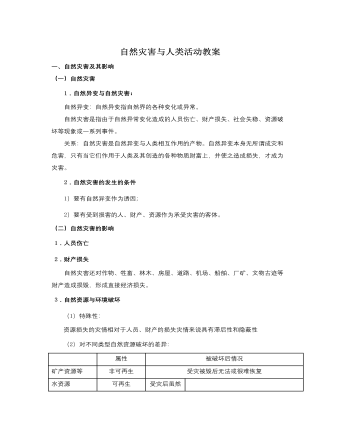
人教版高中地理选修5自然灾害与人类活动教案
(1)类型:常见的农作物病害有:稻瘟病、小麦锈病、棉花枯萎病、烟草炭疽病等。常见的森林病害有:杨树烂皮病、松疱锈病、溶叶病、泡桐丛枝病等。(2)病害发生的原因:A.气候变异等造成的不良环境使得作物对病害抗性降低。B.外来病原体入侵也是病害流行的主要原因。(3)危害:病害使农作物、树木染病从而枯萎甚至死株,导致大面积农田、森林被毁坏。2.虫害和鼠害(1)虫害的常见类型①常见的农作物虫害有:蝗虫、黏虫、水稻螟、棉铃虫等。其中危害最大的是蝗虫。②常见的森林虫害有松材线虫、松毛虫、杨树蛀干害虫、泡桐大袋蛾等。其中松材线虫是世界上最具危险性的森林虫害,被列为国际、国内重大检疫对象。(2)鼠害及危害①重灾区:农田、牧场及森林。②危害:害鼠啃食植株,在地下打洞,危害植物根系,使农业减产,森林草地遭到破坏。(3)虫、鼠害的特点:繁殖快、适应能力强(4)造成虫害和鼠害流行的因素:①适宜繁殖的气候条件、②自然或人为因素造成的天敌减少等,
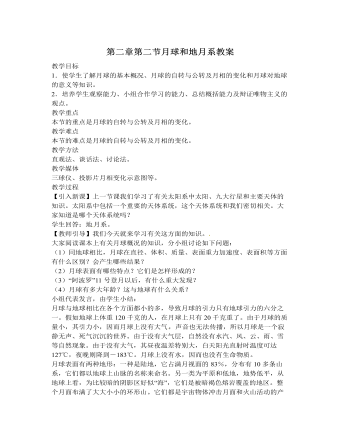
人教版高中地理选修1第二章第二节月球和地月系教案
我们将三球仪中的月球放在地球和太阳之间时,对照“月相成因图”,它的暗面完全对着地球,而被太阳照亮的一面正对着太阳,我们看不到月亮,这时正是农历初一,被称为“新月”。又称为“朔”。 过了新月,月亮被照亮的部分慢慢地转向地球。当它从太阳的光辉中出现时,便出现了一丝蛾眉的弯月,此时为农历的初三、初四,因其形似蛾眉,被称为“蛾眉月”。此后,被太阳光照亮的部分越来越多地转向地球,当有一半亮面和一半暗面都对着地球时,明亮部分和黑暗部分的界线似乎像一张弓中没有拉动的弦。此时是夏历初七、初八,称为“上弦月”。这时月亮很明亮,有时在白天也能看见。在往后,月亮明亮部分越来越增大,当它转到与新月正好相反时,被太阳照亮的部分全都对着地球,看起来月亮就似一轮圆月,此时正是 农历十五、十六、十七,称为“满月”,又称为“望”。
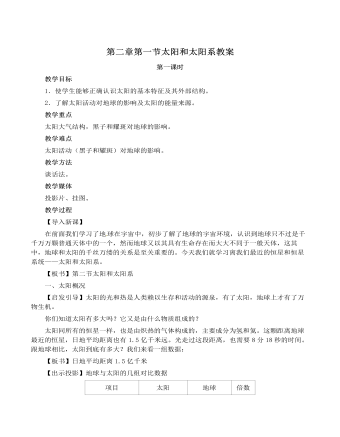
人教版高中地理选修1第二章第一节太阳和太阳系教案
教学过程【导入新课】在太阳系中,九大行星就好像一个家庭中的九个兄弟,有许多共性,今天,我们就一起来了解九大行星在运动特征和结构特征上的共同之处。【板书】3.九大行星的运动特征和结构特征【启发引导】请同学们一起阅读地图册上的“太阳系模式图”,读图分析:(1)九大行星在公转的方向、轨道等方面有什么共性?(2)图中符号“i”、“e”代表什么意思?这两组数字能说明什么问题?九大行星公转的方向相同,均为自西向东转,我们称为同向性。符号“i”表示轨道倾角。(简介黄道、黄道面、轨道倾角)各大 行星的轨道倾角都很小,只有水星和冥王星的大一些,最大也不过17°,说明九大行星的公转轨道近似在同一个平面上,我们称之为共面性。符号“e”代表公转轨道椭圆的偏心率,即焦点到椭圆中心的距离与椭圆半长轴之比,它决定椭圆的形状。偏心率越小,越趋向于圆,当偏心率为0时,轨道就是圆。
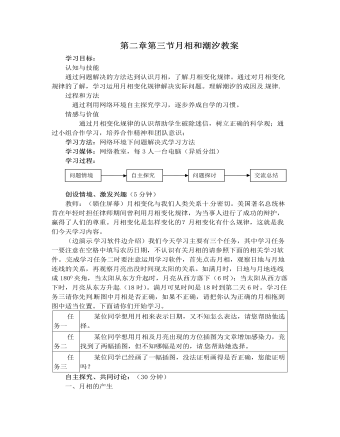
人教版高中地理选修1第二章第三节月相和潮汐教案
创设情境、激发兴趣(5分钟)教师:(锁住屏幕)月相变化与我们人类关系十 分密切。美国著名总统林肯在年轻时担任律师期间曾利用月相变化规律,为当事人进行了成功的辩护,赢得了人们的尊重。月相变化是怎样变化的?月相变化有什么规律,这就是我们今天学习内容。(边演示 学习软件边介绍)我们今天学习主要有三个任务,其中学习任务一要注意在空格中填写农历日期,不认识有关月相的请参照下面的相关学习软件。 完成学习任务二时要注意运用学习软件,首先点击月相,观察日地与月地连线的关系,再观察月亮出没时间现太阳的关系。如满月时,日地与月地连线成1800夹角,当太阳从东方升起时,月亮从西方落下(6时);当太阳从西方落下时,月亮从东方升起 (18时)。满月可见时间是18时到第二天6时。学习任务三请你先判 断图中月相是否正确,如果不正确,请把你认为正确的月相拖到图中适当位置。下面请你们开始学习。
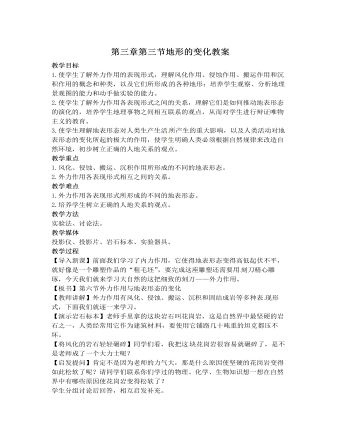
人教版高中地理选修1第三章第三节地形的变化教案
在自然界也是如此,可以看到砾石、沙、粉砂、粘土等颗粒大小不同的沉积物。【出示投影片提问】(河流下游三角洲示意图)这是一幅河流下游三角洲的示意图,你能用沉积作用的原理来解释它的形成过程吗?学生讨论、回答。【教师小结】河流携带着大量的泥沙,到达下游时由于流速降低,泥沙大量沉积,常常会形成宽广平坦的三角洲和冲积平原。在那里土壤肥沃,灌溉便利,通常是良好的农业区。【转折过渡】流水的沉积作用给人类带来了肥沃的冲积平原,风力的沉积作用给人类又带来了什么呢?【分析讲解】在沙漠中有大量的沙丘,这些沙丘在风力作用下会成为流动沙丘,掩没农田和村庄,甚至是整个城市。人类正在探索控制沙漠扩展的方法。【转折过渡】沉积物经过物理的、化学的以及生物化学的变化和改造,又会重新变成坚硬的岩石,这种作用叫做团结成岩作用。
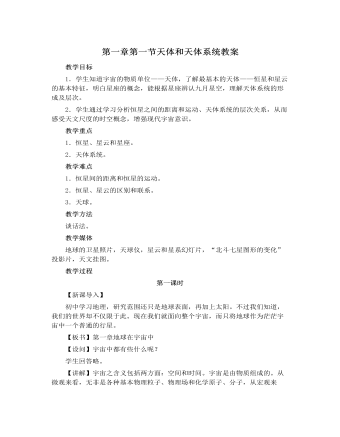
人教版高中地理选修1第一章第一节天体和天体系统教案
【概括】天体是在不断的运动着的。运动着的天体互相吸引和互相绕转,从而形成天体系统。【板书】四、天体系统【启发】天体系统有大有小,大的天体系统又可包含许多小的天体系统。刚才同学们提到的三个天体系统之间是如何包含的呢?(银河系含太阳系,太阳系含地月系)【挂图讲解】地月系只有两个天体,地球和月球,它们之间的平均距离为384401千米;太阳系则包括太阳、九大行星、数十颗卫星及其它天体,整个太阳系的直径至少100亿千米以上;而银河系则拥有2000多亿颗太阳恒星及恒星系统,包括了我 们用肉眼能看到的所有恒星,其主体部分的直径达7万光年,太阳就处于距银河系中心2.3万光年的位置上。【讲解】银河系已如此庞大,是否 就是最大的天体系统呢?是否就是我们的宇宙呢?还远远不是。利用天文望远镜,我们可以观测到在银河系之外,还有约10亿个类似的天体系统,它们被统称为河外星系。
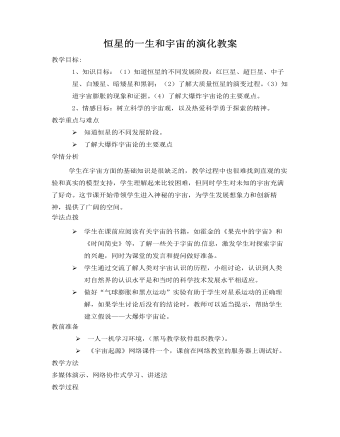
人教版高中地理选修1恒星的一生和宇宙的演化教案
①演示动画,理解大爆炸宇宙论②主要观点:? 大约150亿年前,我们所处的宇宙全部以粒子的形式、极高的温度、极大的密度,被挤压在一个“原始火球”中。? 大爆炸使物质四散出击,宇宙空间不断膨胀,温度也相应下降,后来相继出现在宇宙中的所有星系、恒星、行星乃至生命。2、其它宇宙形成理¬——稳定理论3、大胆猜测:宇宙的将来史蒂芬·霍金是英国物理学家,他提出的黑洞理论和宇宙无边界的设想成了现代宇宙学的重要基石。霍金的宇宙无边界的设想是这样的:第一,宇宙是无边的。第二,宇宙不是一个可以任意赋予初始条件或边界的一般系统。霍金预言宇宙有两种结局:永远膨胀下去,不断地扩大,我们将看到所有星系的星球老化、死亡,剩下我们孤零零的,在一片黑暗当中。或者会塌缩而在大挤压处终结科学巨人霍金:探索的精神)
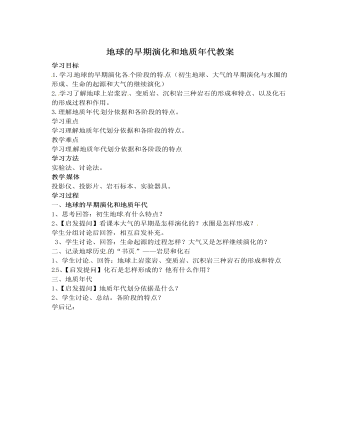
人教版高中地理选修1地球的早期演化和地质年代教案
学习方法实验法、讨论法。教学 媒体投影仪、投影片、岩石标本、实验器具。学习过程一、地球的早期演化和地质年代1、思考回答:初生地球 有什么特点?2、【启发提问】看课本大气的早期是怎样演化的?水圈是怎样形成? 学生分组讨论后回答,相互启发补充。3、学生讨论、回答:生命起源的过程怎样?大气又是怎样继续演化的?二、记录地球历史 的“书页 ”——岩层和化石1、学生讨论 、回答:地球上岩浆岩、变质岩、沉积岩三种岩石的形成和特点2 5、【启发提问】化石是怎样形成的?他有什么作用?三、地质年代1、【启发提问】地质年代划分依据是什么?2、学生讨论、总结。各阶段的特点?学后记:
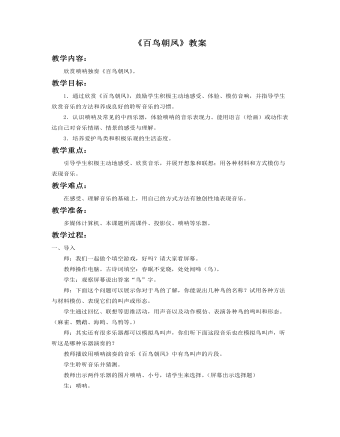
《百鸟朝凤》教案
导入 师:我们一起做个填空游戏,好吗?请大家看屏幕。 教师操作电脑。古诗词填空:春眠不觉晓,处处闻啼(鸟)。 学生:观察屏幕说出答案“鸟”字。 师:下面这个问题可以展示你对于鸟的了解,你能说出几种鸟的名称?试用各种方法与材料模仿、表现它们的叫声或形态。 学生通过回忆、联想等思维活动,用声音以及动作模仿、表演各种鸟的鸣叫和形态。(麻雀、鹦鹉、海鸥、乌鸦等。) 师:其实还有很多乐器都可以模拟鸟叫声,你们听下面这段音乐也在模拟鸟叫声,听听这是哪种乐器演奏的? 教师播放用唢呐演奏的音乐《百鸟朝凤》中有鸟叫声的片段。 学生聆听音乐并猜测。 教师出示两件乐器的图片唢呐、小号,请学生来选择。(屏幕出示选择题) 生:唢呐。
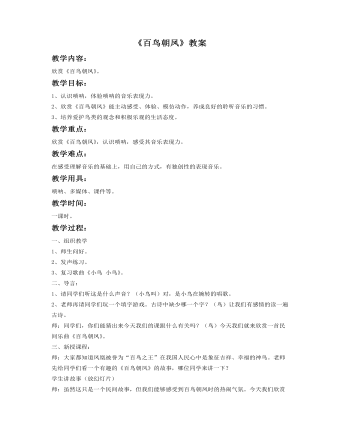
《百鸟朝凤》教案
一、组织教学1、师生问好。2、发声练习。3、复习歌曲《小鸟 小鸟》。二、导言:1、请同学们听这是什么声音?(小鸟叫)对,是小鸟在婉转的唱歌。2、老师再请同学们玩一个填字游戏。古诗中缺少哪一个字?(鸟)让我们有感情的读一遍古诗。师:同学们,你们能猜出来今天我们的课跟什么有关吗?(鸟)今天我们就来欣赏一首民间乐曲《百鸟朝凤》。三、新授课程:师:大家都知道凤凰被誉为“百鸟之王”在我国人民心中是象征吉祥、幸福的神鸟。老师先给同学们看一个有趣的《百鸟朝凤》的故事,哪位同学来讲一下?学生讲故事(放幻灯片)
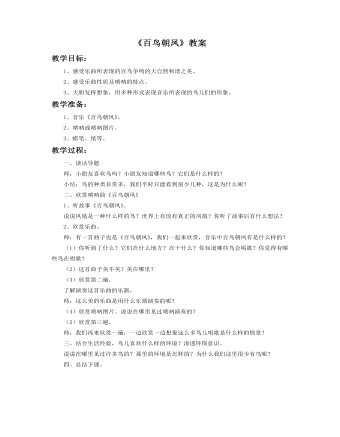
《百鸟朝凤》教案
一、谈话导题 师:小朋友喜欢鸟吗?小朋友知道哪些鸟?它们是什么样的? 小结:鸟的种类非常多,我们平时只能看到很少几种,这是为什么呢? 二、欣赏唢呐曲《百鸟朝凤》 1、听故事《百鸟朝凤》。 说说凤凰是一种什么样的鸟?世界上有没有真正的凤凰?你听了故事后有什么想法? 2、欣赏乐曲。 师:有一首曲子也是《百鸟朝凤》,我们一起来欣赏,音乐中百鸟朝凤有是什么样的? (1)你听到了什么?它们在什么地方?在干什么?你知道哪些鸟会唱歌?你觉得有哪些鸟在唱歌? (2)这首曲子美不美?美在哪里?(3)欣赏第二遍。了解演奏这首乐曲的乐器。 师:这么美的乐曲是用什么乐器演奏的呢? (4)欣赏唢呐图片。说说在哪里见过唢呐演奏的? (5)欣赏第三遍。 师:我们再来欣赏一遍,一边欣赏一边想象这么多鸟儿唱歌是什么样的情景?
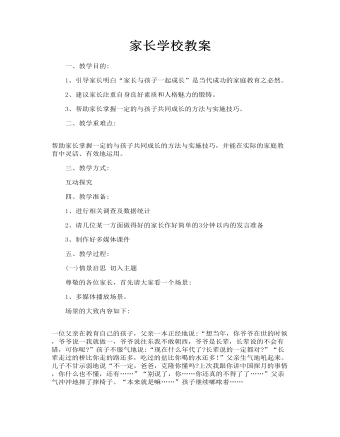
家长学校教案
二、教学重难点: 帮助家长掌握一定的与孩子共同成长的方法与实施技巧,并能在实际的家庭教育中灵活、有效地运用。 三、教学方式: 互动探究 四、教学准备: 1、进行相关调查及数据统计 2、请几位某一方面做得好的家长作好简单的3分钟以内的发言准备 3、制作好多媒体课件 五、教学过程: (一)情景启思 切入主题 尊敬的各位家长,首先请大家看一个场景: 1、多媒体播放场景。 场景的大致内容如下:
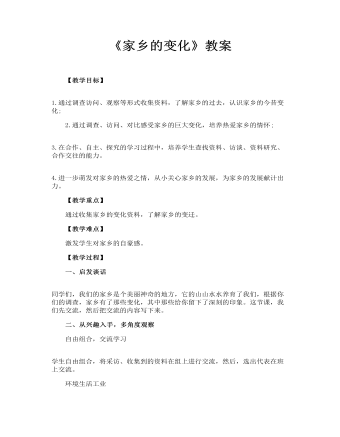
《家乡的变化》教案
一、启发谈话 同学们,我们的家乡是个美丽神奇的地方,它的山山水水养育了我们,根据你们的调查,家乡有了那些变化,其中那些给你留下了深刻的印象。这节课,我们先交流,然后把交流的内容写下来。 二、从兴趣入手,多角度观察 自由组合,交流学习 学生自由组合,将采访、收集到的资料在组上进行交流,然后,选出代表在班上交流。 环境生活工业 多角度观察农业、旅游、饮食、交通

大班美术教案
一、导入。1. 组织游戏《猜猜我是谁》,请幼儿闭上眼睛用手触摸被猜幼儿的脸,然后说出被猜幼儿的姓名,并引导幼儿说说你是怎么发现的。(如,他的脸比较长、他的眼睛很大、她的嘴巴很小等。)2. 请幼儿说说你喜欢的人是谁,他长的什么样?引导幼儿说出人物的典型特征。3. 幼儿仔细观察自己喜欢的人的脸,再与画册中的人物相比较,看与哪一张脸相同。4. 请幼儿为自己喜欢的人画一张像,引导幼儿把人物的典型特征表现出来。二、作画。1. 幼儿开始作画,教师为作画有困难的幼儿做指导。2. 出示范画,请幼儿欣赏并说出范画中人物的典型特征。引导幼儿抓住典型特3. 征大胆表现。
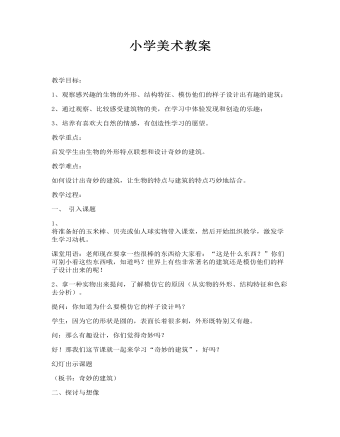
小学美术教案
一、 引入课题1、 将准备好的玉米棒、贝壳或仙人球实物带入课堂,然后开始组织教学,激发学生学习动机。课堂用语:老师现在要拿一些很棒的东西给大家看:“这是什么东西?”你们可别小看这些东西哦,知道吗?世界上有些非常著名的建筑还是模仿他们的样子设计出来的呢!2、拿一种实物出来提问,了解模仿它的原因(从实物的外形、结构特征和色彩去分析)。
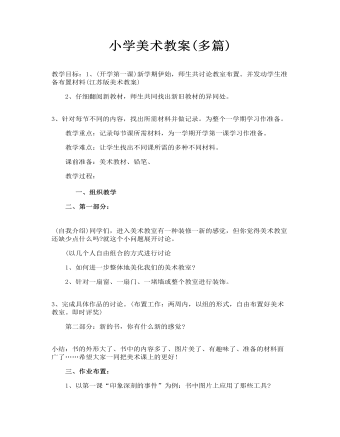
小学美术教案(多篇)
二、第一部分: (自我介绍)同学们,进入美术教室有一种装修一新的感觉,但你觉得美术教室还缺少点什么吗?就这个小问题展开讨论。 (以几个人自由组合的方式进行讨论 1、如何进一步整体地美化我们的美术教室? 2、针对一扇窗、一扇门、一堵墙或整个教室进行装饰。 3、完成具体作品的讨论。(布置工作:两周内,以组的形式,自由布置好美术教室。即时评奖)
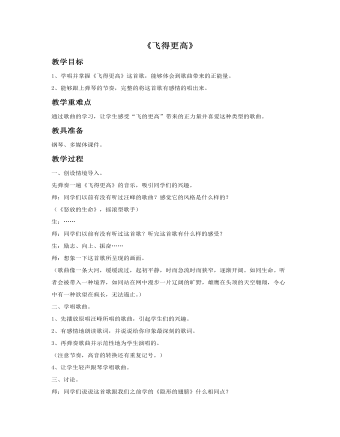
《飞的更高》教案
教学过程一、创设情境导入。先弹奏一遍《飞得更高》的音乐,吸引同学们的兴趣。师:同学们以前有没有听过汪峰的歌曲?感觉它的风格是什么样的?(《怒放的生命》,摇滚型歌手)生:……师:同学们以前有没有听过这首歌?听完这首歌有什么样的感受?生:励志、向上、振奋……师:想象一下这首歌所呈现的画面。(歌曲像一条大河,缓缓流过,起初平静,时而急流时而狭窄,逐渐开阔。如同生命。听者会被带入一种境界,如同站在网中漫步一片辽阔的旷野,雄鹰在头顶的天空翱翔,令心中有一种欲望在疯长,无法遏止。)

《青藏高原》教案
这是作曲家张千一创作的一首歌曲。以明朗高亢而富有藏族风格的旋律,热情地歌颂了美丽庄严的青藏高原,表达了对祖国锦绣山川的眷恋、热爱之情。全曲为羽调式;节拍以四四拍子为主,间插以四二、四三拍子,引子为散板;曲式结构为有引子、前奏的二段体。引子开始,由人声合唱出一个明朗、高亢、山歌风的衬腔,把人们带入到辽阔的青藏高原的意境之中。接着,由器乐演奏深化了这一音乐主题。A段由起承转合的四个乐句构成。第一乐句作为全曲音乐主题的集中体现,具有秀美、明亮、亲切的特征;第二乐句继续承接着这一特征,切分节奏的运用使之更具活力;第三乐句作为一个转折,主要在前半句的音区和旋律音调上发生了变化,较低的音区和较为低回委婉的旋律,使感情表达更显真挚;第四乐句开头出现的后半拍起唱的节奏,使之既富有变化,又富有动力,后半乐句的旋律与第二乐句的结尾相同,使之具有“合”部的特征。

